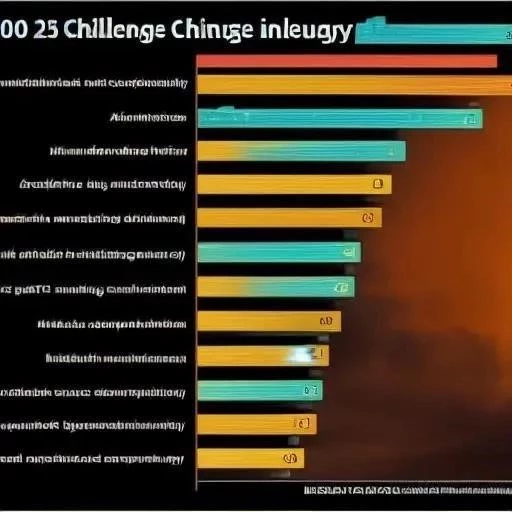The year 2025 promises exciting advancements in technology, but also presents a unique set of challenges for the industry to overcome. Rapid technological evolution, coupled with shifting consumer demands and a complex global landscape, necessitates a proactive and adaptive approach. Navigating these hurdles will be crucial for sustained growth and innovation. The most significant Top Challenges in the Tech Industry [2025] will revolve around talent acquisition, ethical considerations in AI, and maintaining cybersecurity in an increasingly interconnected world. Let’s delve deeper into the Top Challenges in the Tech Industry [2025] that companies will face.
One of the most persistent and pervasive issues facing the tech industry is the ongoing shortage of skilled professionals. Demand for developers, data scientists, cybersecurity experts, and AI specialists far outstrips the available supply, creating a highly competitive job market. This shortage puts pressure on companies to offer attractive compensation packages, benefits, and career development opportunities to attract and retain top talent. Furthermore, companies need to invest in internal training programs to upskill existing employees and bridge the skills gap.
- Investing in Education and Training: Partner with universities and vocational schools to develop relevant curriculum.
- Expanding Recruitment Efforts: Look beyond traditional talent pools and embrace diversity and inclusion.
- Creating a Positive Work Environment: Foster a culture of innovation, collaboration, and growth.
- Offering Competitive Compensation and Benefits: Attract and retain talent with competitive packages.
As artificial intelligence becomes increasingly integrated into various aspects of our lives, ethical concerns are becoming more prominent. Issues such as bias in algorithms, data privacy, and the potential for job displacement need to be carefully addressed. Companies developing and deploying AI systems must prioritize ethical considerations and ensure that their technologies are used responsibly and for the benefit of society.
The ever-increasing reliance on digital technologies has made the tech industry a prime target for cyberattacks. Sophisticated hackers are constantly developing new and innovative ways to breach security systems and steal sensitive data. Companies must invest heavily in cybersecurity measures, including firewalls, intrusion detection systems, and employee training, to protect themselves and their customers from these threats. Furthermore, international collaboration and information sharing are essential to combat cybercrime effectively.
Addressing these Top Challenges in the Tech Industry [2025] requires a multifaceted approach that encompasses innovation, collaboration, and a commitment to ethical principles. The future of the tech industry depends on the ability to navigate these challenges and create a more sustainable, equitable, and secure digital world.
Quantum computing, while still in its nascent stages, holds the potential to revolutionize numerous industries, from drug discovery to financial modeling. However, the complexity of quantum algorithms and the fragility of quantum hardware present significant engineering and scientific hurdles. The development of stable and scalable quantum computers requires substantial investment in research and infrastructure. Moreover, understanding the potential impact of quantum computing on existing cryptographic systems is crucial. As quantum computers mature, they could render current encryption methods obsolete, necessitating the development of post-quantum cryptography to safeguard sensitive information. The transition to post-quantum cryptography represents a significant challenge, requiring widespread adoption of new algorithms and security protocols.
- Investing in Research and Development: Support fundamental research in quantum computing and related fields.
- Developing Post-Quantum Cryptography: Accelerate the development and standardization of new cryptographic algorithms.
- Preparing for Disruption: Assess the potential impact of quantum computing on existing systems and infrastructure.
The metaverse, along with augmented reality (AR) and virtual reality (VR), collectively known as extended reality (XR), presents both immense opportunities and novel challenges. While XR technologies promise to transform entertainment, education, and communication, questions remain about their long-term impact on society. Concerns regarding accessibility, digital equity, and the potential for social isolation need to be addressed. Furthermore, ensuring data privacy and security in immersive digital environments is paramount. The regulatory landscape surrounding the metaverse is still evolving, and clear guidelines are needed to protect users and promote responsible innovation. The challenge lies in harnessing the potential of XR technologies while mitigating their risks and ensuring that they contribute to a more inclusive and connected world.
Successfully overcoming these multifaceted challenges will determine the trajectory of the tech industry in 2025 and beyond; Proactive planning, ethical considerations, and a commitment to collaboration are essential for navigating the complex landscape and realizing the full potential of technological innovation.
The year 2025 promises exciting advancements in technology, but also presents a unique set of challenges for the industry to overcome. Rapid technological evolution, coupled with shifting consumer demands and a complex global landscape, necessitates a proactive and adaptive approach. Navigating these hurdles will be crucial for sustained growth and innovation. The most significant Top Challenges in the Tech Industry [2025] will revolve around talent acquisition, ethical considerations in AI, and maintaining cybersecurity in an increasingly interconnected world. Let’s delve deeper into the Top Challenges in the Tech Industry [2025] that companies will face.
The Talent Crunch: Finding and Retaining Skilled Professionals
One of the most persistent and pervasive issues facing the tech industry is the ongoing shortage of skilled professionals. Demand for developers, data scientists, cybersecurity experts, and AI specialists far outstrips the available supply, creating a highly competitive job market. This shortage puts pressure on companies to offer attractive compensation packages, benefits, and career development opportunities to attract and retain top talent. Furthermore, companies need to invest in internal training programs to upskill existing employees and bridge the skills gap.
Strategies for Addressing the Talent Gap:
- Investing in Education and Training: Partner with universities and vocational schools to develop relevant curriculum.
- Expanding Recruitment Efforts: Look beyond traditional talent pools and embrace diversity and inclusion.
- Creating a Positive Work Environment: Foster a culture of innovation, collaboration, and growth.
- Offering Competitive Compensation and Benefits: Attract and retain talent with competitive packages.
Ethical Considerations in Artificial Intelligence
As artificial intelligence becomes increasingly integrated into various aspects of our lives, ethical concerns are becoming more prominent. Issues such as bias in algorithms, data privacy, and the potential for job displacement need to be carefully addressed. Companies developing and deploying AI systems must prioritize ethical considerations and ensure that their technologies are used responsibly and for the benefit of society.
Cybersecurity Threats in an Interconnected World
The ever-increasing reliance on digital technologies has made the tech industry a prime target for cyberattacks. Sophisticated hackers are constantly developing new and innovative ways to breach security systems and steal sensitive data. Companies must invest heavily in cybersecurity measures, including firewalls, intrusion detection systems, and employee training, to protect themselves and their customers from these threats. Furthermore, international collaboration and information sharing are essential to combat cybercrime effectively.
Addressing these Top Challenges in the Tech Industry [2025] requires a multifaceted approach that encompasses innovation, collaboration, and a commitment to ethical principles. The future of the tech industry depends on the ability to navigate these challenges and create a more sustainable, equitable, and secure digital world.
The Rise of Quantum Computing: Opportunity and Uncertainty
Quantum computing, while still in its nascent stages, holds the potential to revolutionize numerous industries, from drug discovery to financial modeling. However, the complexity of quantum algorithms and the fragility of quantum hardware present significant engineering and scientific hurdles. The development of stable and scalable quantum computers requires substantial investment in research and infrastructure. Moreover, understanding the potential impact of quantum computing on existing cryptographic systems is crucial. As quantum computers mature, they could render current encryption methods obsolete, necessitating the development of post-quantum cryptography to safeguard sensitive information. The transition to post-quantum cryptography represents a significant challenge, requiring widespread adoption of new algorithms and security protocols.
Navigating the Quantum Landscape:
- Investing in Research and Development: Support fundamental research in quantum computing and related fields.
- Developing Post-Quantum Cryptography: Accelerate the development and standardization of new cryptographic algorithms.
- Preparing for Disruption: Assess the potential impact of quantum computing on existing systems and infrastructure.
The Metaverse and Extended Reality: Defining Reality in a Digital World
The metaverse, along with augmented reality (AR) and virtual reality (VR), collectively known as extended reality (XR), presents both immense opportunities and novel challenges. While XR technologies promise to transform entertainment, education, and communication, questions remain about their long-term impact on society. Concerns regarding accessibility, digital equity, and the potential for social isolation need to be addressed. Furthermore, ensuring data privacy and security in immersive digital environments is paramount. The regulatory landscape surrounding the metaverse is still evolving, and clear guidelines are needed to protect users and promote responsible innovation. The challenge lies in harnessing the potential of XR technologies while mitigating their risks and ensuring that they contribute to a more inclusive and connected world.
Successfully overcoming these multifaceted challenges will determine the trajectory of the tech industry in 2025 and beyond. Proactive planning, ethical considerations, and a commitment to collaboration are essential for navigating the complex landscape and realizing the full potential of technological innovation.
Sustainability and Environmental Responsibility
The tech industry, often perceived as clean and forward-thinking, actually has a significant environmental footprint. From the energy consumption of data centers to the e-waste generated by discarded devices, the industry’s impact on the planet is substantial. Addressing this requires a fundamental shift towards sustainable practices. This includes designing energy-efficient hardware and software, utilizing renewable energy sources to power data centers, and implementing robust recycling programs for electronic waste. Furthermore, companies need to be transparent about their environmental impact and accountable for their actions. Consumers are increasingly demanding environmentally responsible products and services, and companies that prioritize sustainability will gain a competitive advantage.
Bridging the Digital Divide: Ensuring Equitable Access
While technology has the potential to improve lives and create opportunities, it also risks exacerbating existing inequalities. The digital divide, the gap between those who have access to technology and those who do not, remains a significant challenge. Factors such as income, location, and education level can all contribute to this divide. Bridging this gap requires a concerted effort from governments, businesses, and non-profit organizations. This includes investing in infrastructure to expand internet access to underserved communities, providing affordable devices and internet plans, and offering digital literacy training programs. Ensuring that everyone has the opportunity to participate in the digital economy is essential for creating a more equitable and inclusive society.



